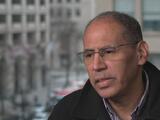The migration lottery: Haitian migrants abandon 'American dream' and head to Canada

Many never made it across the border from Texas, and remain in camps in Mexico hoping against all hope for another opportunity. Others were deported back to Haiti, their worst nightmare. The everlasting turmoil – political assassinations, gang violence and asphyxiating poverty, was the reason they fled in the first place.
For the few who made it across, there was a brief celebration, before reality began to hit.
“I see that the situation here is very complicated,” said Nixon Pilorge, a 29-year-old Haitian migrant who arrived in the United States with his wife and baby in late December and was released after spending 10 days in immigration detention. “It's very difficult to get papers. We need lawyers and we don;t have money,” he added.
So, his American Dream has quickly transformed into a Canadian Dream.
Pilorge is among the tens of thousands of Haitians who fled to various countries across South America in search of work following a devastating 2010 earthquake. After President Joe Biden took office in January last year, many Haitians believed – mistakenly – that the doors to the United States would miraculously open for them.
In September last year, a logjam of some 15,000 Haitian migrants tried crossing the river to Del Rio, Texas, in the process creating a makeshift migrant camp under the border bridge, after U.S. authorities began to turn away those seeking entry.
Not long after, Pilorge set out with his wife and infant daughter from Chile, traversing nine countries to reach the U.S. border, following in the footsteps of those in Del Rio.
Migrants depend on family and friends
With no money, and no ability to work until their asylum case is filed, which can take months, they must depend on the generosity of others for food and lodging. Their daughter got sick and they struggled to find medical help.
After less than two months staying with a relative in Tampa, Pilorge realized it was time to move on.
“My friends say its better in Canada, they help you with food and housing there,” he added.
So next week, the family plans to take the long bus journey via New York and Pittsburgh, to try his luck with Canadian immigration services.
One of his friends who arrived in the United States a few weeks before him and was staying in Rhode Island with relatives, has already moved to Montreal, Canada. “My friend warned me that if our asylum case fails here we will be sent back to Haiti,” he said. “They are deporting people who show up at immigration hearings without a solid case,” he added.
While disappointed, Pilorge, like so many resilient Haitians, remains undaunted. “In Mexico there is no work and it’s too violent. You can’t walk in the street,” he said, adding that there was no way he was going back to Haiti. “They killed our president. You can’t live in that country,” said, referring to the July 7 assassination of president Jovenel Moise.
Immigration lawyers say Canadian immigration rules are certainly more welcoming than the United States, but there remains no guarantee of success.
Poverty are crime are no criteria for asylum
“It’s a little easier,” said Florida immigration lawyer, Elizabeth Ricci, who was contacted by one of the Haitians and explained to him the high bar for asylum in the United States.
“What people don’t understand is that fleeing poverty and crime doesn’t mean you meet the criteria for asylum. That’s why it’s such a high standard,” said Ricci.
Canada's Immigration, Refugees & Citizenship office did not respond to a request for comment or statistics on Haitian arrivals.
The Canadian option is a better fate – at least for now – than what befell most of the Haitians in Del Rio.
“It’s a balloon effect of migrants. We squeeze them here and they go somewhere else. They are being pushed further north, until the balloon freezes solid” said Ambassador Dan Foote, president Biden’s former Special Envoy for Haiti. “There’s nothing here for them in the United States, except a few under-resourced [Good] Samaritans here and there,” he added.
A few thousand Haitians were allowed into the country, some with legitimate asylum claims and others, often with small children, on compassionate grounds.
“Our system was never created to process so many people. It’s madness,” said Alfonso Aguilar, a former Chief of the U.S. Office of Citizenship under President George W Bush. “We need to regularize the system. It’s the worst I have seen in 40 years,” he added.
20,000 Haitians deported, aboard 198 flights
So far, the Biden administration has expelled 20,000 Haitians back to the Caribbean nation aboard 198 planes since taking office, according to Witness at the Border, a group that tracks U.S. government expulsion and deportation flights.
Of those, 161 planes, carrying 17,900 people, have flown in just the last five months.
Most were deported using the controversial law known as Title 42 as the legal premise using covid-19 health grounds to try to stem the migration surge at the southern border.
Migrants allowed temporary entry into the U.S., are usually given notices requiring them to appear in court for an immigration hearing within 60 days where they can seek asylum protection. Others were allowed in under Section 8 of the Immigration Act, which grants a temporary stay while the case is heard by an immigration judge.
The number of Haitians authorised to enter under Title 8 soared last year, from 229 in the month of October 2020 to 11,589 in September, according to data from the Department of Homeland Security (DHS). Between June 2021 and February this year, nearly 38,000 Haitians were admitted under Title 8.
Immigrants who are allowed temporary entry into the United States receive notices requiring them to appear in court for an immigration hearing within 60 days where they can apply for asylum protection.
Pilorge says he showed up for his hearing in Orlando on Feb 2 and was told to file for asylum or risk being deported.
He chose to self-deport.
"They don’t qualify for asylum”
"Immigration advocates, who sympathize deeply with the plight of Haitians, are also at a loss to know how to help Haitians. “Under current law they don’t qualify for asylum,” said Adam Isacson, an immigration expert at the Washington Office on Latin America (WOLA). “Most of them were living in Brazil or Chile, where they weren't facing specific threats to their lives or meet the legal definition for normal asylum,” he added.
Saddest of all, many were misled into believing they could win asylum.
“From what we are hearing, when they get here they don’t know the asylum system. But we can’t rewrite the law,” said Gianni Gustave, a legal assistant with Haitian Bridge Alliance in San Diego.
“It’s really sad. It’s not what they want to hear. They went through uncalculatable risk to get here,” he added.
“There’s no good options here,” said Gepsie Metellus, executive director of SantLa, a Haitian community organization in Miami.
Most of the Haitians who were allowed to enter last year, like Pilorge, were admitted “just to shut down that [Del Rio] operation,” she said. “We’ve probably seen about 2,000 migrants this years, compared to just a trickle before,” she added.
Groups like SantLa and Haitian Bridge Alliance are trying to help the Haitian migrants figure out their status, which varies from case to case. Some may be eligible for types of assistance, such a food stamps and mental health counselling.
Only those who arrived in the United States before July 29, 2021 can apply for Temporary Protected Status, which was granted by the Biden administration after president Moise’s assassination.
The migration lottery
“It’s a mess, decades in the making,” said David Bier, an immigration expert at the Cato Institute, who says that in the absence of a coherent immigration system many desperate migrants view it as a lottery that’s worth a shot.
“That’s our immigration system. It’s a lottery, a matter of luck,” he said. “It’s what happens when you stop processing people legally. Now you have to deal with preventing them. It’s totally pointless,” he added.
Bier attributed the crisis to the government’s failure to have a system in place capable of processing legal migration. “We can’t just deport our way out of it. We don’t have enough planes, we don’t have enough buses, we don’t have enough agents,” he said.



